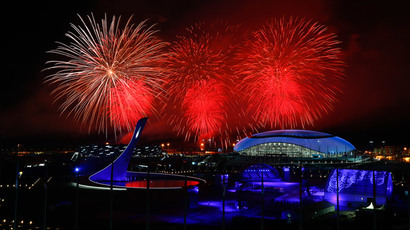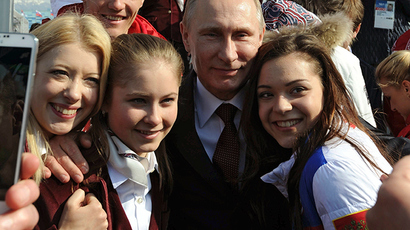Paralympics to show athletes with disabilities able to do anything – Putin
The upcoming Paralympic Games in Sochi will demonstrate that there are no limits to people who have the will to overcome their disabilities - a good lesson for host Russia, which still has a way to go to make such people fully accepted by the community.
This expectation was voiced by Russian President Vladimir Putin in an interview to Russian media ahead of the Paralympics in Sochi.
VGTRK:Mr. President, we have here large screens showing the Paralympians competing, and in a matter of days, such broadcasts will be shown across the country, with our logos, the logo of the VGTRK, and that of RBC which is the general partner of the Games, isn’t that right, Alexander?
RBC:Yes, we as a privately-owned channel decided to give every support to the Games, and to promote the Paralympic ideas among the political and business elite.
Vladimir Putin: And I had meant to tell you I think it's great.
VGTRK:And so now that the Paralympic Games which will be widely covered are only a few days away, and also acknowledging the fact that there is no way to talk about the Olympics and the Paralympics in terms of comparison, what are your expectations of these Paralympic Games that are in fact a logical continuation of the Olympic Games?
VP: First of all, I would like to agree with what you just said. The Paralympic Games are a logical continuation of the Olympic Games. If we look back at history, the precursor to the Paralympics was the Games that took place in 1948 in Great Britain. Originally, the Games were held for the veterans of WWII who were confined to wheelchairs. This movement gradually evolved into the Paralympic Games as we now know them. The first Summer Paralympic Games were held in 1960, and the first Winter Paralympic Games were held in 1976.
And in this sense, the Paralympics are indeed a logical continuation of the Olympic Games. And speaking for myself, I should say I have some quite serious expectations. First of all, the audience of the Paralympics has grown significantly over the last years, and it is very important to us, we want people to follow these Games and see that there is no limit to what people can do even with the limited abilities. It is a good educational experience for society, something which teaches the right values, and it also gives impetus to the authorities at all levels in their work on creating a barrier-free environment.
VGTRK:And not only in sports, right?
VP: And not only in sports, but everywhere, because it keeps everyone aware of the problem. By the way, Sochi was the very first project in Russia where a barrier-free environment was fully implemented. And I expect the regions to continue working along this track in order to create a barrier-free environment nation-wide. We have signed an international convention to this effect, we have also developed a comprehensive program, and another thing - this needs the full focus of the administrations at all levels. My other expectation is the victories of our national Paralympic team.

VGTRK:So you're no longer cautious about speaking about victories, after the Olympic triumph?
VP: But I am. I am quite cautious; I'm not saying things like how many wins or in which sports. But of course we are all hoping for some medals, especially since we know what our Paralympians are capable of. They performed very well at the previous Games, as you know, they ranked first in the total count. And the International Paralympic Committee officials say it quite openly that they are expecting the highlights of the Games to come from the Russian athletes. And so do we.
Q:Mr. Putin, when we met before the Olympics, you said you still had to take care of your regular duties as president, but you would attend Olympic events whenever you got the chance to get away from work. We saw you in the stands a lot – ice hockey, figure skating… What about now? Do you have plans to attend Paralympic events?
VP: Yes, I would very much like to attend some events. For example, we just saw sledge hockey on the screen here. I guess you know that I’ve been kind of a hockey buff lately. See how passionate this sport is? It’s in no way inferior to the Olympics. So, of course, I would love to see some games. But I’m not sure about my schedule, and in fact I don’t even know what the schedule of the Paralympic events will be. Of course, I will definitely attend the Opening Ceremony. Cross-country skiing events are very interesting. And Paralympians competing in alpine skiing – this is just incredible! I just don’t know at this point which events I will be able to attend.
Q:Let’s say you can’t make it to a certain event, say, sledge hockey – do you watch them on TV?
VP: Yes, I watch them on TV. I watched the Olympics as much as I could, and I will certainly do my best to watch the Paralympics.
Q:From the moral point of view, this event will be just as important as the 17 days of the Olympic Games. To people who are coming here, sport is not just a part of their lives; sport is an integral part of their lives. Their life quite often depends on their athletic achievements. And they are grateful to sport for that. So here is my question. We had 112 candidates for the national team. Only 64 will make the cut. What would you say to those left out?
VP: I don’t think they need my recommendations. If they were candidates for the national team, this means they are excellent athletes. This means they’re very strong psychologically, and I’m sure they don’t need me to comfort them. They will keep working; they will take part in other sporting events; and if they are still young, they will one day make it into the national Paralympic team, and will perform well. All they need to do is keep working, and they will get there. I have no doubt about that.

Q:Like you said, these are not people with disabilities; these are people with immense abilities! In fact, the reason we decided to support the Paralympic Games was precisely because this is an excellent role model for all us, an excellent example of courage and character. This is precisely why we have decided to broadcast these Games. The only question I have is this. I don’t know, maybe it’s just Russia… You said, this movement has been growing since 1948. But in our country, the level of awareness is not that high. There are three million people with disabilities in Russia. I don’t know, maybe after watching these Games, somebody will decide to hire a disabled person, for example. Or maybe help a disabled person when you see one in the street. It seems to me, we are still somewhat short in this respect. We don’t promote these things enough.
VP: I agree. A lot depends in this respect on all of us, including mass media, especially electronic media. Now, we have people with us who do sports coverage for a living, as well as those who have chosen a different area of reporting. But, as you all know, sports journalism, especially broadcast sports journalism is a very peculiar line of business. In sports reporting, it is crucial to be able to capture the passion and excitement of competition, the beauty of motion, the determination of athletes. It requires a special set of skills, and a level of proficiency where it isn’t enough to merely film athletes with a single camera as they ski, skate, or play hockey. Capturing the beauty of sports is an art. And I suppose capturing the beauty of a Paralympic sport is an even greater artistic challenge. That is why the efficiency of our sports promotion will largely depend on the people in charge of the coverage. Of course, this is primarily the task of the government, but we cannot do without your skillful contribution.
Q:Mr. Putin, Olympic broadcasts on Channel One enjoyed fantastic, record-breaking viewer ratings. People love to watch the Olympics, because it is about energy and happiness, it is a celebration that we all need. But with regard to the Paralympics, how do we change the predominant public attitude vis-à-vis those [disabled] people? After all, those are super heroes with unlimited abilities. How do we change the public attitude, so that this celebration does not vanish as soon as the Paralympics is over, so that the public would constantly think about people who are confined to this kind of life?
VP: The government must do more for people with disabilities, providing a barrier-free environment for them in every locality all over the country. One key aspect that we absolutely need to ensure is employment opportunities for the disabled. I won’t go into detail, listing all of the government’s policies aimed at encouraging businesses to create jobs for people with disabilities. We provide special incentives for companies, but so far, all of it is dramatically insufficient.
That is why our task and the purpose of the Paralympics is to make sure the public, as well as officials in every tier of authority, will not forget it once it’s over. And I absolutely agree with you on this. That will require government policies, special-purpose programs, as well as support from media organizations. And if you see that public authorities are underperforming in this regard (whether it’s municipal or federal agencies, whatever), it is worth pointing that out. But I know you don’t need me to tell you that – you are always willing to do that.
Q:Mr. Putin, I imagine that, during the Olympics, many Russians did not only root for Russian champions and medal-winning athletes (whom you have recently awarded for their achievements). They also supported contestants from neighboring countries. I personally saw Russian spectators give a warm welcome to Georgian athletes in figure skating and downhill skiing – and it was truly heartwarming. All Russians rooted for Darya Domracheva of Belarus. And there was a lot of cheering for the Ukrainian biathletes. So it’s no secret that many Russians root for our brotherly nations and neighboring countries as well as for Russia. But what is your idea of “our people”? Who do you cheer for, besides Russians?
VP: In my opinion, when we host a large international sporting event, all of our guests are “our people.” They should all be equal in our perception.














